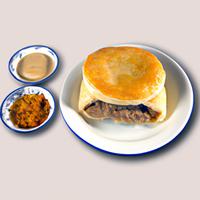
1 serving (50 grams) contains 100 calories, 2.0 grams of protein, 5.0 grams of fat, and 15.0 grams of carbohydrates.

Log this food in SnapCalorie

Nutrition Information
Calories |
473.2 | ||
|---|---|---|---|
% Daily Value* |
|||
| Total Fat | 23.7 g | 30% | |
| Saturated Fat | 4.7 g | 23% | |
| Polyunsaturated Fat | 0 g | ||
| Cholesterol | 47.3 mg | 15% | |
| Sodium | 709.8 mg | 30% | |
| Total Carbohydrates | 71.0 g | 25% | |
| Dietary Fiber | 4.7 g | 16% | |
| Sugars | 9.5 g | ||
| protein | 9.5 g | 19% | |
| Vitamin D | 0 mcg | 0% | |
| Calcium | 94.6 mg | 7% | |
| Iron | 2.4 mg | 13% | |
| Potassium | 236.6 mg | 5% | |
* Percent Daily Values are based on a 2,000 calorie diet. Your daily values may be higher or lower depending on your calorie needs.
Food Attributes
Source of Calories
About Kueh pie tee
Kueh Pie Tee is a popular Peranakan snack originating from Southeast Asian cuisine, particularly Malaysia and Singapore. This delicacy features thin, crispy pastry shells filled with a savory mixture made from julienned vegetables like turnip and carrots, occasionally combined with shrimp or minced meat. Typically garnished with chili sauce, fried shallots, and a sprig of fresh cilantro, Kueh Pie Tee offers a delightful combination of textures and flavors. Nutritionally, the dish is low in calories due to its vegetable-based filling, providing fiber and essential vitamins. However, the deep-fried shells and toppings like fried shallots contribute to higher fat content, which may not align with low-fat dietary goals if consumed in excess. Its colorful and customizable nature makes it an attractive option for gatherings, but moderation is recommended for a balanced approach.



